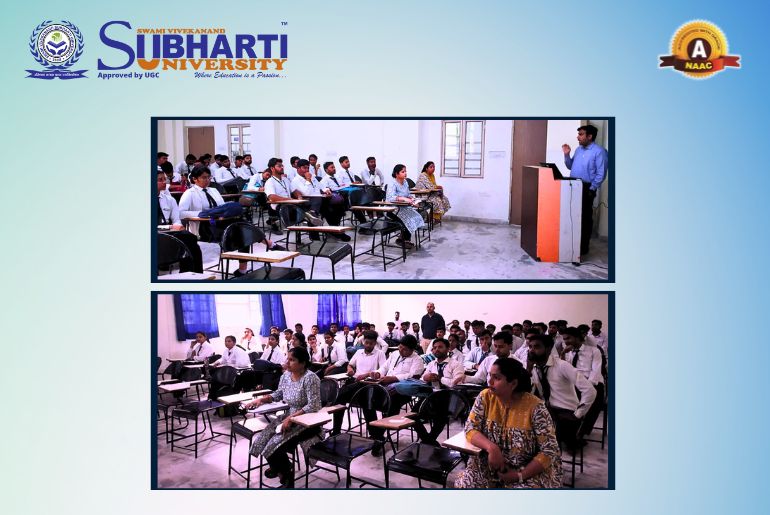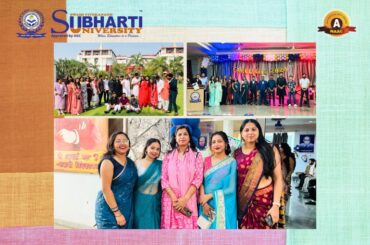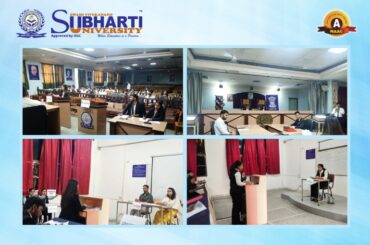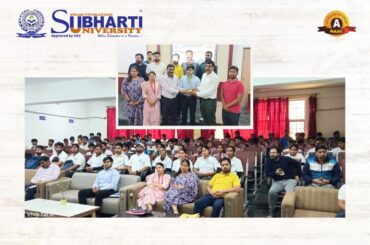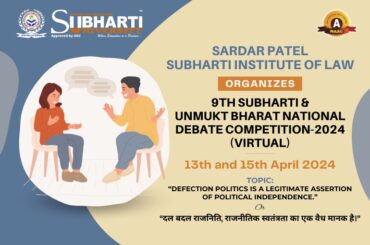Dr. Ambedakr Chair organizes Monthly Lecture Series on
“The Making of the Constitution of India: Exploring the Role of Dr. B.R. Ambedkar” Seventh Lecture organizes
As part of Monthly Lecture Series on “The Making of the Constitution of India: Exploring the Role of Dr. B.R. Ambedkar” the 7th Lecture was organized in Seminar Hall/LT, Kharvel Subharti College of Pharmacy at 11.00 AM onwards. The Lecture was delivered by Mr. Ajay Raj Singh, Assistant Professor, Faculty of Law. The Students of Kharvel Subharti College of Pharmacy took part with great zeal and interest.
Mr. Ajay Raj Singh has delivered a very motivating lecture. During the Lecture, first he explained what a Constitution is. Dr. Bhimrao Ambedkar has been an outstanding contribution by drafting the Constitution of India and he has become a champion of human rights. Dr. Ambedkar was born on the 14th April, 1891 in Mhow, Madhya Pradesh. After graduating from Elphinstone College, Bombay in 1912, he joined Columbia University, USA where he was awarded Ph.D. Later he joined the London School of Economics & obtained a degree of D.Sc. (Economics) & was called to the Bar from Gray’s Inn. He continued the crusade for social revolution until the end of his life on the 6th December 1956. He was honored with the highest national honor, ‘Bharat Ratna’ in April 1990. He said that the fundamental law, written or unwritten, that establishes the character of government is known as the Constitution of a country. Ambedkar was the Chairman of the Drafting Committee which played an important role in the formation of the Constitution. Dr. Ambedkar handled the task of presenting the draft constitution, answering various questions raised on it, and making necessary changes according to the suggestions of the Constituent Assembly.
The Constitution of a country describes the organization, composition and structure of the government as well as distribution of powers, functions and limitations on the powers of various organs of government. It also prescribes the extent and manner to exercise the sovereign powers by the government. He also highlighted the important features of the Constitution of India. He said that the Constitution of India is associated with the phrases “Of the people, for the people and by the people ”. The Indian Constitution is the legal document that ensures the working of the government system in India. Sir Ivor Jennings called the Constitution of India a “lawyer’s paradise” because the legal language and phraseology adopted by the constitution-makers, makes it a complex document. He told that the Constitution of India is the lengthiest
written Constitution of the world. There are a number of factors which contributed to the elephantine size of the Indian Constitution such as geographical and historical factors. The Constitution of India has borrowed most of its provisions from the constitutions of various other countries as well as from the Government of India Act of 1935. Dr B R Ambedkar proudly acclaimed that the Constitution of India has been framed after ‘ransacking all the known Constitutions of the world’.
As part of Monthly Lecture Series on “The Making of the Constitution of India: Exploring the Role of Dr. B.R. Ambedkar” the 6th Lecture on “Constitution of India and its Salient Features” was organized in Seminar Hall, Bhikaji Cama Subharti College of Hotel Management at 10.30 AM onwards. The Lecture was delivered by Ms. Sonal Jain, Assistant Professor, Faculty of Law. The Students of Bhikaji Cama Subharti College of Hotel Management took part with great zeal and interest.
Ms. Sonal Jain has delivered a very motivating lecture. During the Lecture, first she explained what a Constitution is. She said that the fundamental law, written or unwritten, that establishes the character of government is known as the Constitution of a country. The Constitution of a country describes the organization, composition and structure of the government as well as distribution of powers, functions and limitations on the powers of various organs of government. It also prescribes the extent and manner to exercise the sovereign powers by the government. She also highlighted the important features of the Constitution of India. She said that the Constitution of India is associated with the phrases “Of the people, for the people and by the people ”. The Indian Constitution is the legal document that ensures the working of the government system in India. Sir Ivor Jennings called the Constitution of India a “lawyer’s paradise” because the legal language and phraseology adopted by the constitution-makers, makes it a complex document. She said that the Constitution of India is the lengthiest written Constitution of the world. There are a number of factors which contributed to the elephantine size of the Indian Constitution such as geographical and historical factors. The Constitution of India has borrowed most of its provisions from the constitutions of various other countries as well as from the Government of India Act of 1935. Dr B R Ambedkar proudly acclaimed that the Constitution of India has been framed after ‘ransacking all the known Constitutions of the world’.

